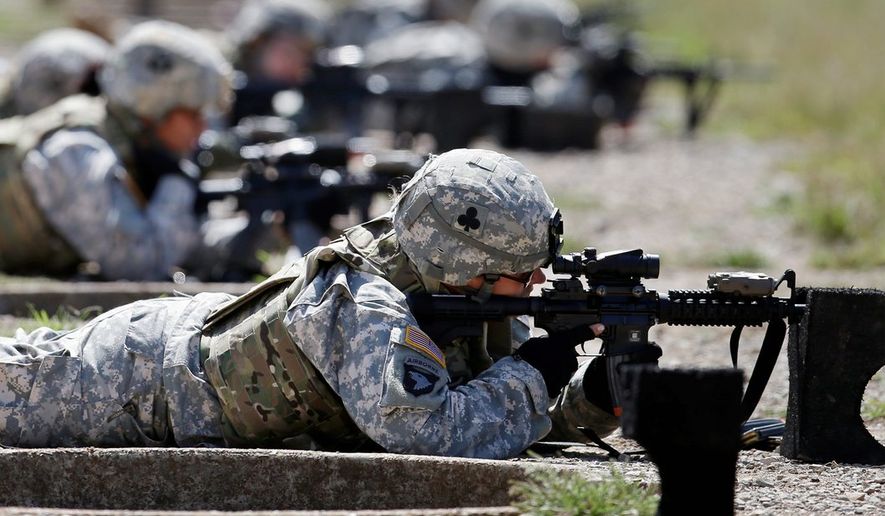As the military completes testing to open combat positions to women, critics say that lawmakers and defense officials are ignoring reports that suggest integrating women into ground warfare would reduce effectiveness in battle and harm unit cohesion.
Others doubt the ability of women to pass the rigorous training required to be an elite Army Ranger, Marine commando or Navy SEAL, as already this year a high percentage of female service members have dropped out of such training.
Military leaders told members of Congress last week that they will meet the deadline to open combat positions to women by 2016, and expect to finalize the rules for those changes by this fall.
“We are on track to meet the deadlines. And I personally have received … interim update[s] about how it’s all going. And I feel pretty good about it,” Air Force Secretary Deborah James said at a House Armed Services Committee hearing.
But critics of women serving in combat say members of Congress are not asking enough questions and instead are going along with a political goal of the Obama administration that will ultimately harm the military.
“Congress hasn’t had any hearings,” said Elaine Donnelly, president of the Center for Military Readiness. “There is no way women can be accommodated in the combat arms without a number of negative consequences that really can’t be justified. There’s no trade-off.”
Women make up about 15 percent of the U.S. military. Many combat jobs are open to women now, including riverine units and submarines, though some remain closed as the services finish testing to determine what women are capable of and if it’s enough to serve in combat.
Since former Defense Secretary Leon E. Panetta announced in 2013 that women would be allowed to serve in ground combat, the Pentagon has opened about 71,000 positions previously closed to women, according to Navy Lt. Cmdr. Nate Christensen, a Defense Department spokesman.
“Thousands of women have served alongside men in Iraq and Afghanistan, and their record of performance has been nothing less than outstanding,” Cmdr. Christensen said. “Our goal is to ensure that the mission is carried out by the best qualified and the most capable service members, regardless of gender.”
The armed services appear to be indicating that they will open all positions to women in 2016, though they could ask for exceptions to keep some jobs closed to women, said Kayla Williams, a project associate at the Rand Corp. If the services ask for any exceptions in January, some Marine Corps and special operations jobs are the most likely ones to remain closed, she said.
Ms. Williams said she expects service members to quickly accept women serving in combat positions based on troops’ reactions to other changes, such as the repeal of the ban on open homosexuals and the admission of women at military academies.
“If history repeats itself, there will be grumbling and hesitation and resistance as changes are rolled out. Then, within a very short time, people will adjust to the normal,” she said.
Some reports, however, indicate the opposite.
A British study released late last year found that physiological differences put women at a disadvantage in strength-based and aerobic fitness tests. Even women who are able to overcome the physiological disadvantages will likely be injured more easily or become tired more quickly, making them easier targets and poorer marksmen in combat.
Army Maj. Angela Scott was one of 26 women who tried this year to pass the second Ranger Training Assessment Course. The 16-day program is run by the Army National Guard at Fort Benning, Georgia, and serves as a trial to select who goes to Ranger School. The training resembles Ranger School, including tests for physical fitness, swimming ability and land navigation, and it includes a six-mile march.
After having trained two months specifically for the course, Maj. Scott dropped out after eight days. Only 58 out of 122 soldiers who started the program graduated; only five of the 58 who passed were female.
Despite dropping out, Maj. Scott said the military should be a place where anyone who is willing to work hard can serve in any position.
“There should be one standard, and whoever wants to attempt to meet this standard should be allowed,” Maj. Scott, who served in Iraq twice, said in a Defense Department release. “If they don’t meet the standard, then that’s on them.”
The five women who passed the course will attend the Ranger School next month as part of a broader assessment of which combat roles should remain closed to women, Army Times reported. Those who complete the course will receive the Ranger tab but will not be assigned to a Ranger regiment, the article said.
Several female Marines are training at Twentynine Palms in California over the next month to see if they can meet standards to serve in combat. About half of the two dozen women who were training with an infantry unit have dropped out, mostly due to injuries, NPR reported. But almost all of the nearly 20 women who are training with a unit of tanks and armored vehicles are still participating, the article said.
• Jacqueline Klimas can be reached at jklimas@washingtontimes.com.




Please read our comment policy before commenting.